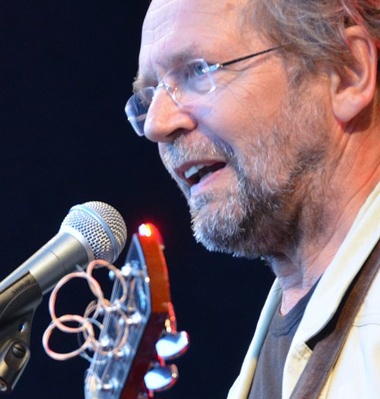Ole Paus, a singer-songwriter whose career has spanned almost half a century, is kissing the record business goodbye with no less than a triple album that he claims is the best work he’s ever done. Paus, 66, insists this will be his last release, appropriately titled Avslutningen (The Finish).

“We love each other, but now we’ll go our separate ways. I no longer know the record business, it isn’t mine anymore,” he told newspaper Aftenposten. That’s probably another way to say that records aren’t profitable anymore, while live concerts and tours could be. And Ole Paus has no plans to stop performing.
Up to now, however, the record business certainly has been his. Since debuting in 1970, the prolific Paus has released more than 30 albums with hundreds of songs in a variety of styles, from romantic ballads to dark soul-searching to cruel, hilarious satire. In 2011, when Morgenbladet had 100 musicians rank the 100 best Norwegian-made albums ever, no one was surprised to see Ole Paus’ first two albums make the list.
Those early works, Der ute, der inne and Garman, planted Paus firmly in a Scandinavian ballad tradition, alongside Sweden’s Cornelis Vreswijk and others. It also put him at the crest of a wave of Norwegian visesang, guitar-based and often simple songs with a message. Paus’ bitter and sarcastic lyrics on the Garman album drew comparisons with Bob Dylan and Leonard Cohen.
[flgallery id=104 /]
Later in the 1970s, he published several editions of his own musical newspaper called Paus-Posten, dripping with irreverent comment on powerful persons in politics, culture, religious affairs and the news of the day. A more recent hit is Mæsjen og Påsjen, about the idle rich, their champagne and their luxury cars. According to Dagbladet, Paus revisits this topic on the new triple album, piling scorn on real-estate baron Christian Ringnes, hotelier Petter Stordalen and others. Asked for comment, they both claimed they were honored to be savaged by Ole Paus.
But dozens if not hundreds of entries in the Paus songbook are not about the rich and powerful. Closest to his attention are the weak and the downtrodden, like the ragged World War II veterans he may have encountered in third-rate bars and on Oslo’s dark streets during his formative years. Paus sings and plays his Martin guitar for the lonely, the drunks, the hookers, the mentally ill and the children of divorced parents, doomed to travel alone by plane between mom and dad. Ole Paus even has a comfort song for an outsider on the anniversary- and holiday-packed calendar of May — the May-day which has absolutely nothing special to it.
Ole Paus is married for the third time to Benedicte Paus, a doctor and professor in medical genetics. They have two daughters. He has two sons and two adopted daughters from earlier relationships.
Well-connected
The son of a high-ranking officer and with the blood of businessmen and civil servants in his veins, Ole Paus received little encouragement at home when he wanted to become a singer. His mother died when he was four. His talent was discovered and encouraged by more senior figures in the 1960s like Alf Cranner and Alf Prøysen. Always a well-connected man, he has cooperated with numerous others, most notably jazz pianist Ketil Bjørnstad and guitarist Jonas Fjeld. Touring with Fjeld as To rustne herrer (Two Rusty Gentlemen), Paus would show off his creativity by asking the audience for a song topic out of the same day’s news. He would then write a brand new song during the intermission and perform it right off the cuff.
Some of his songs have been big hits for others, like Engler i sneen (Snow angels) which Jonas Fjeld and Lynni Treekrem turned into a classic. He is also the creator of Innerst i sjelen (Core of the soul), made famous by Sissel Kyrkjebø. And his Mitt lille land (My little country), originally a song for the EU referendum in 1994, took on an entirely new meaning when used by Maria Mena in the wake of the terrorist attacks on July 22, 2011.
In recent years Paus has interpreted psalms and other religious material in collaboration with Christian record label Kirkelig Kulturverksted, much to the disgust of some core fans. He also does church concerts at Christmastime. It’s been quite a journey from Paus-Posten days, when Paus made few friends in fundamentalist Christian circles with the notorious Satan lever (Satan is alive), a song about demons and exorcism in Bergen. At the time, Paus revealed recently, he received concerned phone calls from the parents of one of his choir-girls.
That choir-girl was Anita Skorgan, another accomplished artist-performer. Both Paus and Skorgan are among the veteran artists on Hver gang vi møtes (Every time we get together), a successful TV-show that has taken Ole Paus to yet another audience.
Paus is inseparable from his guitar and his considerable instrumental skills tend to be overlooked. As for his cruelly worn, smoky voice and often wild, out -of-tune delivery, most Norwegians will immediately recognize it, but not because of its beauty.
Special for Views and News from Norway/Morten Møst

